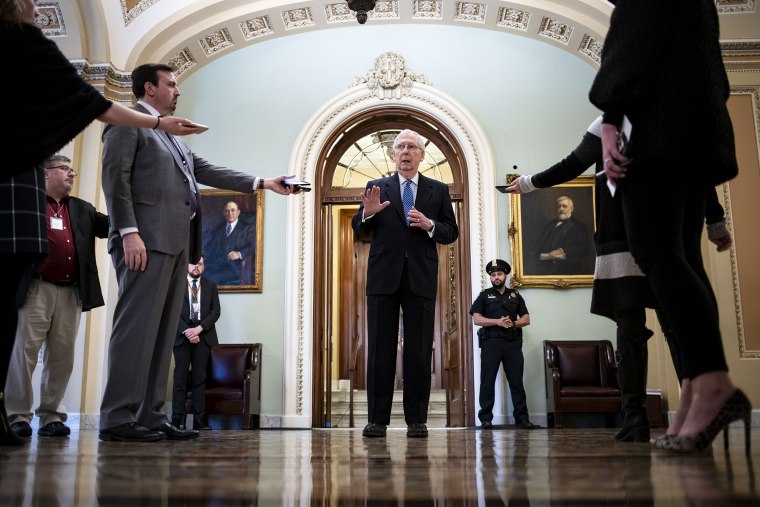Senate Majority Leader Mitch McConnell (R-Ky.) has generally been cooperative when it comes to passing economic aid packages in the midst of the coronavirus pandemic. In fact, the Republicans' Senate leader has been treated largely as a speedbump, as Democrats have worked around him and reached agreements with Treasury Secretary Steven Mnuchin.
But with the next aid package starting to take shape -- what some insiders are referring to as "Phase IV" -- the Kentucky Republican surprised many last week by suggesting he opposed federal aid to states and cities facing fiscal crises. McConnell added that he prefers what he called the "bankruptcy route," in which cash-strapped states filed for bankruptcy.
There's no shortage of problems with such an idea -- among other things, states don't have the legal authority to declare bankruptcy -- and there were broader questions about why McConnell would risk imposing broader economic ruin by ignoring the needs of states in crisis.
Yesterday, the picture came into sharper focus. As Politico reported, the GOP leader suggested he's prepared to help rescue states and cities, "but it will come at a price."
In an interview on Monday, the Senate majority leader said it's "highly likely" the next coronavirus response bill will aid local governments whose budgets have been decimated by lockdowns and now face spiraling deficits. But to unlock that money, McConnell said he will "insist" Congress limit the liabilities of health care workers, business owners and employees from lawsuits as they reopen in the coming weeks and months.
"We probably will do another bill. What I'm saying is it won't just be about money," McConnell said. "The next pandemic coming will be the lawsuit pandemic in the wake of this one. So we need to prevent that now when we have the opportunity to do it."
Now everything is starting to make more sense. Last week, Donald Trump characterized state aid as a bipartisan issue that would garner broad political support, but soon after, McConnell started changing the nature of the conversation: if everyone agreed on federal aid to states, then he and other Republicans wouldn't be in a position to leverage the funding for their own political priorities.
And so, just like that, helping states facing crises became "a Democratic issue." Preventing mass layoffs of school teachers, police officers, and firefighters would be labeled "a Democratic priority." The next question would therefore be, what exactly would the GOP get in exchange for meeting this "Democratic demand."
"I'm open to additional assistance," McConnell added yesterday. "It's not just going to be a check, though, you get my point?"
As a matter of fact, yes. The point appears to be that Democrats are prioritizing a policy solution that will prevent an economic downturn from getting vastly worse, while McConnell is prioritizing legal liability protections for businesses.
"We can't afford to not protect all of the brave people who have been at work during all of this," McConnell told reporters. "It's going to take a certain amount of courage to open your business up again if you think there's a lawyer right out on the curb waiting to go after you if he sees somebody within 6 feet of someone else."
In a press statement yesterday, the Senate majority leader said he'd bring his chamber back into session next week and reminded members not to "get distracted by pre-existing partisan wish-lists" during this time of crisis. The statement added, "The American people do not need tangential left-wing daydreams."
It came the same afternoon as McConnell signaled his possible willingness to trade state aid for legal liability limits.

